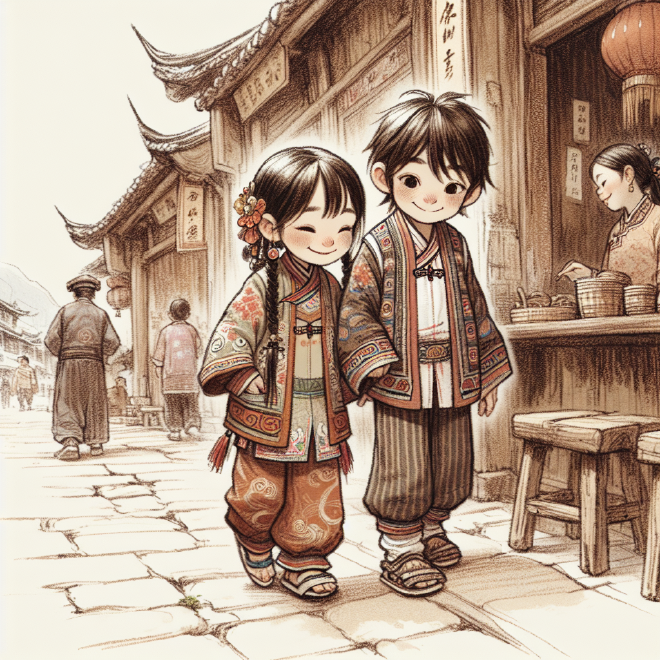镜中缘

Table of Contents
Audio #
汉字 #
丽丽和小明是好朋友。星期天,他们一起去故宫玩。在故宫外面,他们看见地上有一张地图。地图上写着英文,丽丽和小明看不懂。
“这是谁的地图?”丽丽问。
小明说:“不知道,可能是一位游客丢的。”
他们等了一会儿,看见一位外国游客很着急地走来走去。
丽丽走过去,用不太流利的中文问:“你好,请问这是你的地图吗?”
游客很高兴地说:“是我的!谢谢你们!”
丽丽和小明很高兴。他们看着地图,发现上面有很多他们没去过的地方,比如天坛和颐和园。
游客用中文说:“我想去天坛,但是不知道怎么走。”
小明说:“我知道!我可以告诉你。你先往东走,然后往南拐。” 他指着地图给游客看。
游客说:“太感谢你们了!你们的中文真好!”
丽丽笑着说:“没有啦,我们还在学习。”
游客走后,丽丽对小明说:“帮助别人真开心!以后我们也要好好学习中文,帮助更多的人!”
小明点点头:“好!我们一起努力!”
Pinyin #
Lìlì hé Xiǎomíng shì hǎo péngyǒu. Xīngqítiān, tāmen yīqǐ qù Gùgōng wán. Zài Gùgōng wàimiàn, tāmen kànjiàn dìshàng yǒu yī zhāng dìtú. Dìtú shàng xiězhe Yīngwén, Lìlì hé Xiǎomíng kànbudǒng.
“Zhè shì shéi de dìtú?” Lìlì wèn.
Xiǎomíng shuō: “Bù zhīdào, kěnéng shì yī wèi yóukè diū de.”
Tāmen děng le yīhuìr, kànjiàn yī wèi wàiguó yóukè hěn zhāojí de zǒu lái zǒu qù.
Lìlì zǒu guòqù, yòng bù tài liúlì de Zhōngwén wèn: “Nǐ hǎo, qǐngwèn zhè shì nǐ de dìtú ma?”
Yóukè hěn gāoxìng de shuō: “Shì wǒ de! Xièxie nǐmen!”
Lìlì hé Xiǎomíng hěn gāoxìng. Tāmen kànzhe dìtú, fāxiàn shàngmiàn yǒu hěn duō tāmen méi qù guo de dìfang, bǐrú Tiāntán hé Yíhéyuán.
Yóukè yòng Zhōngwén shuō: “Wǒ xiǎng qù Tiāntán, dànshì bù zhīdào zěnme zǒu.”
Xiǎomíng shuō: “Wǒ zhīdào! Wǒ kěyǐ gàosù nǐ. Nǐ xiān wǎng dōng zǒu, ránhòu wǎng nán guǎi.” Tā zhǐzhe dìtú gěi yóukè kàn.
Yóukè shuō: “Tài gǎnxiè nǐmen le! Nǐmen de Zhōngwén zhēn hǎo!”
Lìlì xiàozhe shuō: “Méiyǒu la, wǒmen hái zài xuéxí.”
Yóukè zǒu hòu, Lìlì duì Xiǎomíng shuō: “Bāngzhù biéren zhēn kāixīn! Yǐhòu wǒmen yě yào hǎohāo xuéxí Zhōngwén, bāngzhù gèng duō de rén!”
Xiǎomíng diǎndiǎn tóu: “Hǎo! Wǒmen yīqǐ nǔlì!”
English Translation #
Lili and Xiaoming are good friends. On Sunday, they went to the Forbidden City together. Outside the Forbidden City, they saw a map on the ground. The map was written in English, which Lili and Xiaoming couldn’t understand.
“Whose map is this?” Lili asked.
Xiaoming said, “I don’t know, maybe a tourist dropped it.”
They waited for a while and saw a foreign tourist walking back and forth anxiously.
Lili walked over and asked in not very fluent Chinese, “Hello, excuse me, is this your map?”
The tourist happily said, “It’s mine! Thank you!”
Lili and Xiaoming were very happy. They looked at the map and found many places they hadn’t been to, such as the Temple of Heaven and the Summer Palace.
The tourist said in Chinese, “I want to go to the Temple of Heaven, but I don’t know how to get there.”
Xiaoming said, “I know! I can tell you. You first go east, then turn south.” He pointed to the map for the tourist to see.
The tourist said, “Thank you so much! Your Chinese is really good!”
Lili smiled and said, “Not really, we are still learning.”
After the tourist left, Lili said to Xiaoming, “Helping others is so happy! In the future, we must also study Chinese hard to help more people!”
Xiaoming nodded: “Okay! Let’s work hard together!”
Grammatical Points and Analysis #
Verb-Object Phrases: #
- 看见地图 (kànjiàn dìtú): See a map.
- 帮助别人 (bāngzhù biéren): Help others.
- 学习中文 (xuéxí Zhōngwén): Learn Chinese.
- 去故宫玩 (qù Gùgōng wán): Go to the Forbidden City to play.
Resultative Complements: #
- 看不懂 (kànbudǒng): Can’t understand (看 + 不懂)
- 看见 (kànjiàn): To see (看 + 见)
Directional Complements: #
- 走过去 (zǒu guòqù): Walk over (走 + 过去)
Adverbs: #
- 一起 (yīqǐ): together
- 还 (hái): still
- 太 (tài): too
Sentence Structures: #
- 是…的 (shì…de): used to emphasize a detail about a completed action. E.g., 这是谁的地图?(Whose map is this?) focuses on ownership.
- 先…, 然后… (xiān…, ránhòu…): First…, then…
Use of Modal Particle 了 (le): #
- indicates a change of state or completion of an action. Example: 他们等了一会儿 (Tāmen děng le yīhuìr) - They waited for a while.
Questions #
- 小明和丽丽在哪里找到地图的? (Xiǎomíng hé Lìlì zài nǎlǐ zhǎodào dìtú de?) Where did Xiaoming and Lili find the map?
Click to show the answer
answer #
小明和丽丽在故宫外面找到地图的。(Xiǎomíng hé Lìlì zài Gùgōng wàimiàn zhǎodào dìtú de.) Xiaoming and Lili found the map outside the Forbidden City.
- 为什么丽丽和小明很高兴? (Wèishénme Lìlì hé Xiǎomíng hěn gāoxìng?) Why were Lili and Xiaoming happy?
Click to show the answer
answer #
丽丽和小明帮助了游客,所以他们很高兴。(Lìlì hé Xiǎomíng bāngzhù le yóukè, suǒyǐ tāmen hěn gāoxìng.) Lili and Xiaoming helped the tourist, so they were happy.
Disclaimer: This story is purely fictional and generated by AI. Any similarities to real people, places, or events are purely coincidental.